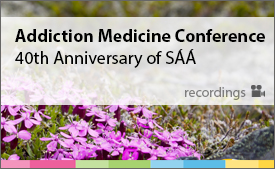Paul Earley, MD, DFASAM
40 ára afmælisráðstefna SÁÁ: Physicians with substance use disorder: Can this model be effectively applied to other populations?
Paul Earley MD, DFASAM, Medical Director of the Georgia Professionals Health Program, in the U.S.
Abstract
Physician Health Programs (PHPs) use multi-year, use contingency-driven, chronic disease management protocols to care for physicians with SUDs.[1, 2] Remarkable recovery rates and increased patient safety comes from drug and alcohol screening, mandatory support and therapy attendance and swift and sure responses to concerning behaviors.[3] Changing a brain-driven illness such as addiction can only occur by shaping attitudes, beliefs and behaviors.[4]
Since their inception, PHPs have been the subject of extensive outcome research which has shown impressive results.[5-12] Good outcomes transfer to other cohorts such as airline pilots,[13] DUI-offenders[14] and probationers.[15] Several authors have suggested that the important elements of such programs can be extracted, building a generalizable model for the long-term management of the chronic disease of addiction.[16-19]
This lecture start by describing PHPs and how they produce impressive outcomes and, at the same time, increase safety for family, co-workers and patients. It will then describe the core elements of these programs, describing how they can be modified for different patient populations. We will consider this long-term system, buttressed by case management using drug screening, coordination of care with outside providers and a robust data management system as a possible model for all who suffer from this complex illness.
References
- FSPHP. FSPHP Physician Health Program Guidelines. 2005 [cited 2016; Available from: http://www.fsphp.org/sites/default/files/pdfs/2005_fsphp_guidelines-master_0.pdf.
- Earley, P., Physicians Health Programs and Addiction among Physicians, in American Society of Addiction Medicine, Principles of Addiction Medicine, R. Ries, et al., Editors. 2014, Lippincott, Williams and Wilkins: Philadelphia. p. 602-621.
- DuPont, R., et al., How are addicted physicians treated? A national survey of Physician Health Programs. J Subst Abuse Treat, 2009. 37(1): p. 1-7.
- Earley, P.H., RecoveryMind training : A Neuroscientific Approach to Treating Addiction. 2017, Las Vegas: Central Recovery Press. xxxi, 452 pages.
- Oreskovich, M.R. and R.M. Caldeiro, Anesthesiologists recovering from chemical dependency: can they safely return to the operating room? Mayo Clinic Proceedings, 2009. 84(7): p. 576-580.
- Buhl, A., et al., Prognosis for the Recovery of Surgeons From Chemical Dependency: A 5-Year Outcome Study. Arch Surg, 2011. 146(11): p. 1286-1291.
- Domino, K., et al., Risk factors for relapse in health care professionals with substance use disorders. JAMA, 2005. 293(12): p. 1453-1460.
- Skipper, G., M.D. Campbell, and R.L. DuPont, Anesthesiologists with Substance Use Disorders: A 5-Year Outcome Study from 16 State Physician Health Programs. Anesth Analg, 2009. 109: p. 891–896.
- McLellan, A.T., et al., Five year outcomes in a cohort study of physicians treated for substance use disorders in the United States. BMJ, 2008. 337: p. 1-6.
- Merlo, L.J., et al., Outcomes for Physicians with Opioid Dependence Treated without Agonist Pharmacotherapy in Physician Health Programs. Journal of Substance Abuse Treatment, 2016. 64: p. 47-54.
- DuPont, R.L. and G.E. Skipper, Physician Health Programs – A model of successful treatment of addiction. Counselor, 2010. Dec: p. 22-29.
- Rose, J.S., et al., Family Medicine Physicians With Substance Use Disorder: A 5-year Outcome Study. Journal of Addiction Medicine, 2017.
- Russell, J.C. and A.W. Davis, Alcohol rehabilitation of airline pilots. 1985, Federal Aviation Administration, Office of Aviation Medicine.
- Kilmer, B., et al., Efficacy of frequent monitoring with swift, certain, and modest sanctions for violations: Insights from South Dakota’s 24/7 Sobriety Project. American Journal of Public Health, 2013. 103(1): p. e37-e43.
- Hawken, A. and M. Kleiman, Managing drug involved probationers with swift and certain sanctions: Evaluating Hawaii’s HOPE. 2009: National Institute of Justice Washington, DC.
- Merlo, L. and R. DuPont, Essential Components of PHP Participation: Perspectives of Participants Five Years Post-Mandatory Monitoring. 2016, Institue for Behavior and Health and University of Florida. p. 5.
- DuPont, R., et al., Setting the standard for recovery: Physicians’ Health Programs. Journal of Substance Abuse Treatment, 2009. 36(2): p. 159-171.
- DuPont, R.L. and G.E. Skipper, Six Lessons from State Physician Health Programs to Promote Long-Term Recovery. Journal of Psychoactive Drugs, 2012. 44(1): p. 72–78.
- DuPont, R.L., M.D. Seppala, and W.L. White, The three missing elements in the treatment of substance use disorders: Lessons from the physician health programs. Journal of addictive diseases, 2016. 35(1): p. 3-7.
Dr. Earley has been an Addiction Medicine Physician for over 30 years. He treats all types of addictive disorders and specializes in the assessment, treatment and management of health care professionals. As a therapist, he works with patients already in recovery, providing long term therapy for those who suffer from this disease.
He is the author of two books and numerous articles on addiction and its treatment. He is a contributing author to the American Society of Addiction Medicine (ASAM) Textbook: Principles of Addiction Medicine and the ASAM Criteria. His most recent book, RecoveryMind Training is an innovative and comprehensive process designed to reengineer addiction treatment. His work was featured in the documentary series on addiction entitled Close to Home by Bill Moyers.
Dr. Earley is the Medical Director of the Georgia Professionals Health Program, Inc., the Physicians Health Program (PHP) for the state of Georgia and the President-elect of the Federation of State Physician Health Programs (FSPHP). He is the current president-elect of the American Society of Addiction Medicine (ASAM). Dr. Earley is the recipient of the ASAM Annual Award in 2015. ASAM states the award is presented “For expanding the frontiers of the field of Addiction Medicine and broadening our understanding of the addictive process, through research and innovation.”

